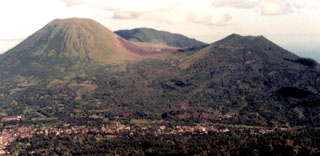Report on Lokon-Empung (Indonesia) — 13 May-19 May 2015
Smithsonian Institution / US Geological Survey
Weekly Volcanic Activity Report, 13 May-19 May 2015
Managing Editor: Sally Sennert.
Please cite this report as:
Global Volcanism Program, 2015. Report on Lokon-Empung (Indonesia) (Sennert, S, ed.). Weekly Volcanic Activity Report, 13 May-19 May 2015. Smithsonian Institution and US Geological Survey.
Lokon-Empung
Indonesia
1.358°N, 124.792°E; summit elev. 1580 m
All times are local (unless otherwise noted)
PVMBG reported that during 6-13 May observers of Lokon-Empung noted white plumes rising 25-50 m above Tompaluan Crater, although inclement weather often prevented observations. Seismicity fluctuated but slightly decreased overall. The Alert Level remained at 3 (on a scale of 1-4). Residents and tourists were reminded not to approach Tompaluan Crater within a radius of 2.5 km. Based on ground observations, the Darwin VAAC reported that an ash plume rose to an altitude of 3 km (10,000 ft) a.s.l. on 20 May. Inclement weather prevented satellite views of the volcano.
Geological Summary. The Lokong-Empung volcanic complex, rising above the plain of Tondano in North Sulawesi, includes four peaks and an active crater. Lokon, the highest peak, has a flat craterless top. The morphologically younger Empung cone 2 km NE has a 400-m-wide, 150-m-deep crater that erupted last in the 18th century. A ridge extending 3 km WNW from Lokon includes the Tatawiran and Tetempangan peaks. All eruptions since 1829 have originated from Tompaluan, a 150 x 250 m crater in the saddle between Lokon and Empung. These eruptions have primarily produced small-to-moderate ash plumes that sometimes damaged croplands and houses, but lava-dome growth and pyroclastic flows have also occurred.
Source: Pusat Vulkanologi dan Mitigasi Bencana Geologi (PVMBG, also known as CVGHM)

